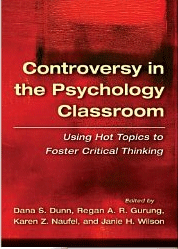“Controversy in the Psychology Classroom: Using Hot Topics to Foster Critical Thinking”

“Controversy in the Psychology Classroom: Using Hot Topics to Foster Critical Thinking”
Edited by Dana S. Dunn, Regan A. R. Gurung, Karen Z. Naufel, and Janie H. Wilson
American Psychological Association
Washington, D.C., 2013
Guide offers teachers advice about ‘hot’ topics
Reviewed by James K. Luiselli, Ed.D., ABPP, BCBA-D
The discipline of psychology certainly generates its share of controversy. In this book, the editors contend that “Some psychology teachers shy away from covering controversial topics out of fear of classroom disruption, student discomfort and the worry of eliciting shocked responses or, worse still, profoundly awkward silences.” At the same time, deep discussion of complex and nonconventional issues produces a vibrant learning environment and fulfills the best tenets of scholarly pursuit. Accordingly, the book is intended to arm faculty with effective strategies and methods for addressing various controversies and advancing psychological literacy.
The audience for the book includes college-level professors, department chairs and program administrators but additionally, teachers of psychology at the high school level. In section I, the chapters consider several “guiding frameworks” when talking about several controversial topics such as race, culture, sexual orientation, mental illness and psychological experimentation to name a few. Readers will also find many practical solutions for establishing acceptable classroom protocol, selecting course materials, explaining grading policies and mentoring students beyond the classroom.
Section II of the book is comprised of four chapters, each one focusing on a specific “hot topic.” The chapter about evolutionary psychology gets at fundamental views of human nature and development, the interplay between biology and learning and a host of “hardcore” beliefs that most students cling to until convinced otherwise. Other chapters discuss wide ranging opinions on spanking children, gender, faith-based beliefs and conducting animal research. The topics notwithstanding, most of these chapter authors conclude similarly about the tactics teachers should employ when engaging students in highly charged discourse and debate.
In Section III, the chapters continue with and expand upon particular areas of controversy, namely teaching about evil and immorality, social justice, religion and disabilities. Like most of the book, the instructional tools contained in these chapters deal broadly with how to outline classroom content, direct verbal exchanges, arrange discussion groups, react to provocative questions from students and the like.
The final chapter in this section summarizes concisely “how instructors can use controversial topics to stimulate student interest in course content as well as teach students to appreciate empirical evidence and apply scientific thinking when studying human behavior.”
The editors have compiled a valuable resource for teaching critical analytic and expository skills to psychology students by embracing and not avoiding areas of controversy. In doing so, they develop intriguing ideas about pedagogy which, at first, may seem uncommon but are supported empirically. For psychology faculty, whatever the academic setting, the book should be an asset for promoting insightful student-to-student and student-to-teacher dialogue from a dialectical perspective. Above all else, it guides teachers to adopt responsible and respectful practices when exploring and resolving some of the most challenging topics within psychology education and training. n
James K. Luiselli, Ed.D., ABPP, BCBA-D, is senior vice president, applied research, clinical training and peer review at the May Institute in Norwood, Mass.
Learn more about the book: Controversy in the Psychology Classroom: Using Hot Topics to Foster Critical Thinking
